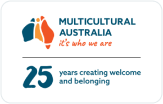Faysel Ahmed Selat developed a sense of responsibility early in life. After losing his father in one of Somalia’s civil wars when he was just an infant, he became the financial breadwinner of the family at the age of 15, working in the mines.
He fled Somalia with his family in 2002 and lived in a refugee camp in Eritrea for almost 13 years, before resettling in Australia in 2013.
He said that meeting the Multicultural Australia (MA) staff at the airport was not an interaction he was expecting.
“I was [initially] worried: who would meet us at the airport? How would we communicate? But with MA there, having people who speak [Somali] and explain[ing] everything in my own language, I was not expecting that,” Faysel recalled.
“They were culturally appropriate, very professional, and welcoming. That really stands out in my memory.”
His family’s first experience at a local hospital was quite different. Within a year of living in Brisbane, he realised that language barriers could severely impact household welfare and public health after his family struggled to communicate with a local doctor.
This led him to pursue tertiary study in public health. After starting his studies at the University of Queensland, he began volunteering at Refugee Health Queensland (RHQ) to demonstrate the importance of interpreters and translators in hospital environments and advocate for doctors to engage them prior to seeing CALD patients.
Barely a year after he graduated in 2019, the pandemic poignantly amplified Faysel’s advocacy for a culturally informed public health strategy.
Barely a year after he graduated in 2019, the pandemic poignantly amplified Faysel Ahmed Selat’s advocacy for a culturally informed public health strategy.
By the time pandemic restrictions began in Queensland, Faysel had already established enduring community connections through Multicultural Australia, that helped him become a youth engagement coordinator for the CALD COVID Health Engagement Project (CCHEP), a Queensland government initiative delivered in partnership with several health and community service organisations.
There he leveraged his connection with African youth and elders to communicate urgent health advice and increase uptake of the COVID-19 vaccine.
At CCHEP, he demonstrated the important influence of religion in family decision making. He ensured that Islamic perspectives were considered in sharing information about the COVID-19 vaccination.
By October 2021, with the help of Queensland Health, Faysel set up a vaccination hub at Somali House – a community centre for Brisbane’s Somalian diaspora – to increase vaccination rates amongst refugees, migrants and First Nations peoples in Inala and surrounding areas.
Within three months, the Somali community became the most vaccinated multicultural group in Brisbane.
Now the president of Somali Queensland, a role traditionally held by elders, Faysel works closely with Multicultural Australia and the Queensland Police Service to develop culturally informed approaches to engage with Somali youth.
His work over the past six years as a youth leader continues to change the conversation about refugees and those seeking asylum.






